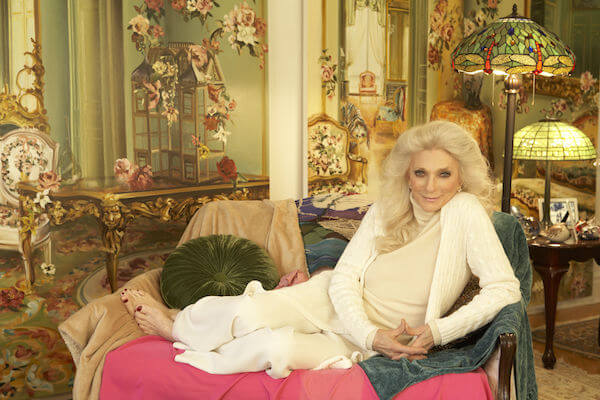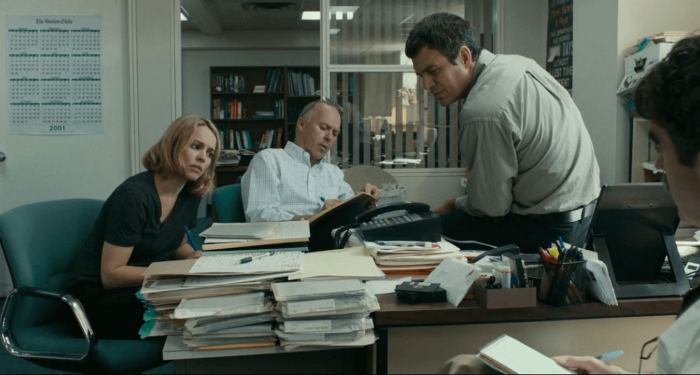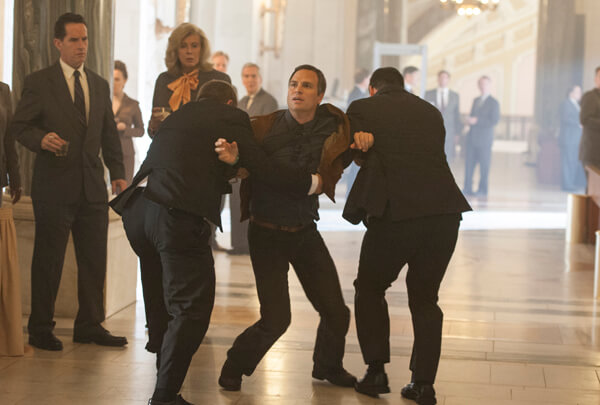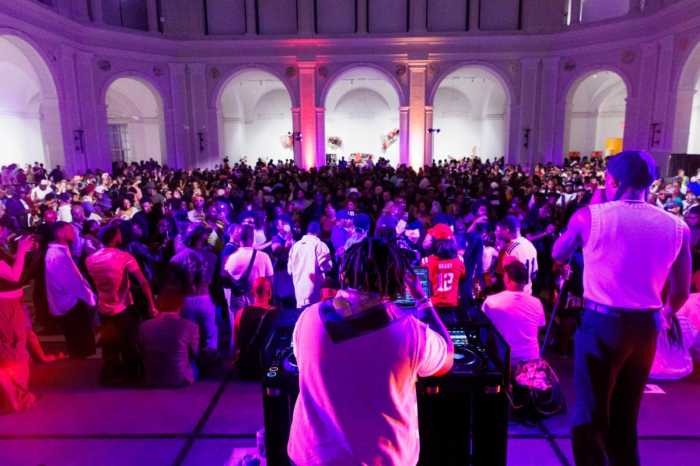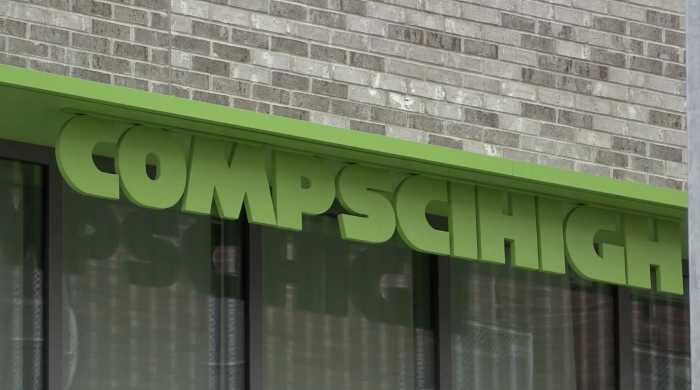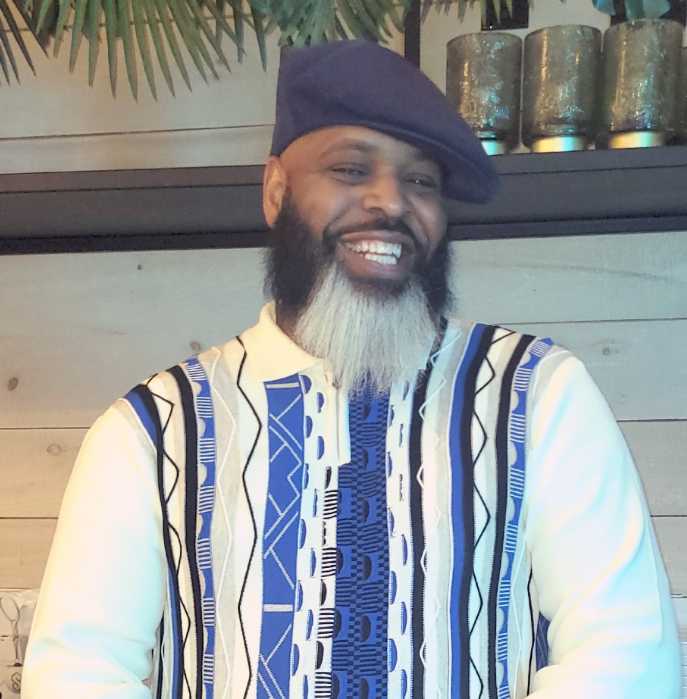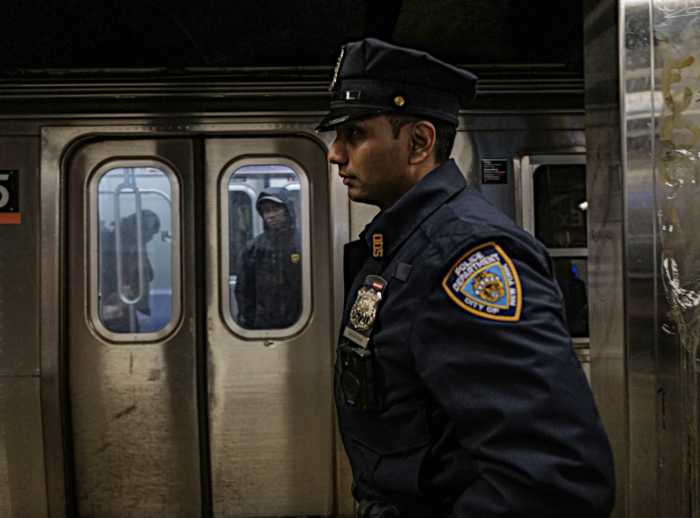Zoë Wanamaker with David Noh. | COURTESY: HELENE DAVIS
BY DAVID NOH | One of the greatest, most versatile actresses alive, Zoë Wanamaker, just graced our city with her appearance in the Encores! revival of “Zorba!” Having long admired her on stage and screen, I dashed to interview her and found her to be wonderfully warm, with a wicked wit and terrific recall.
“The last musical I did was a long time ago,” she recalled. “It was ‘Cabaret’ in 1975, pretty good [laughs]. Madame Hortense, my character in ‘Zorba’ is a glorious, colorful Frenchwoman living in Crete and obviously sort of a kind of outsider in this very pagan, rustic community. She’s a very delicate, extraordinary creature, passionate with no limit to her emotional availability. It’s a long time since I’ve seen the movie, but she’s spectacular. You can meet these people and think, ‘Where the hell did they come from?’ and she’s one of them. It’s a fascinating musical because like the two I’ve done now — ‘Chicago’ and ‘Cabaret’ — it’s based on the actual play script and the songs and music come out of situations that could be spoken. I think they’re just beautifully written, and the fact that there’s a suicide and a murder in ‘Zorba’ is another thing. It’s a dark musical but it has some brilliant lyrics and some wonderful, delightful characterful songs, very clever. I didn’t know this show before and I’ve got three songs!”
As for the show’s lyricist and composer, “I never met Fred Ebb, but I’ve met John Kander. He’s been around our rehearsals and is so sweet and adorable. I didn’t audition for this — Encores! approached me. It was a bit of a shock and a challenge. It’s something that scared the pants off me and still does. Anyway, I’m laughing a lot, at myself being picked up by men and twirled around and that makes me laugh. I’m working with the most wonderful people, glorious singers and actors. I feel like pinching myself all the time. This could be professional suicide, you never know.
Wanamaker arrived in New York three days before our interview.
Zoë in “Zorba,” timeless Collins, a “Gigi” dissent
“I just finished the play ‘Stevie,’ about the poet Stevie Smith, at the Hampstead Theater in London,” she said. “I don’t know whether that play is past its sell-by date, but I found the woman fascinating and the play very different and slightly off the wall. It’s got poetry and one man in it who becomes various characters, and her Lion Aunt, whom she lives with. Yes, Mona Washbourne was fantastic as her, in the Glenda Jackson film of it, and I had Linda Barrett, a wonderful actress with a fantastic career.
“It’s a very literary play and I don’t know whether that whole era has gone from England, as well as that whole culture of reading. And Smith spoke Russian, French, Greek, and Latin. It’s that kind of intelligence that we don’t have anymore, which is a shame. But because of the revival of this play, Smith’s collected works are coming back again, as well as her first novel, so I’m very pleased about that.”
Wanamaker is so veddy British that it’s something of a surprise to learn she was born right here in New York. At the age of three, however, she moved to London because of her actor father Sam Wanamaker’s persecution by the McCarthy blacklist.
“Daddy knew he was going to be subpoenaed before the [House Un-American Activities] committee and my mother, probably, too, so he took a film in London. My mother packed up the house in Connecticut, we went there, and Daddy didn’t get his passport back for 10 years. He was the first Method actor to go to England.”
While there, Wanamaker’s great dream was to open the Globe Theatre to make Shakespeare truly accessible to everyone.
“When I started my career in 1970, Daddy was just starting that and it took 27 years of fighting to get it done. It all had to do with money and great antagonism about it being in the wrong place and the wrong configuration. I was very affected by this, people like Jonathan Miller saying, ‘I don’t know why your father is trying to build the Globe. We’ve got Stratford on Avon!’ And, of course, now it’s exactly what he said it would be, you can’t get in, and the whole area has exploded with new people moving in, as he predicted. He died before its completion, so he never saw it.
“But the Sam Wanamaker Playhouse which is indoors, has opened, and it’s absolutely beautiful, candle-lit. The seats are still very uncomfortable but it’s just what Daddy wanted: an absolute complex with a cinema, museum, and apartments for visiting talent. But it still needs money because it’s not subsidized, except by public support.”
Zoe’s parents were initially resistant to her becoming an actress “because they were like any parents about their child’s being hurt by rejection and they didn’t want that. So I went to art school first and my mother insisted that if I was going to be an actress, I also had to learn typing, which was funny, because I’m dyslexic.
“I went into the secretarial world for about six months, which was a disaster, and then I worked for a brilliant casting director friend of my parents. That was a great education which made me initially hate the business because it’s all about a photograph— what you look like — and individual taste, not necessarily talent. It’s also what works, chemically, so now I can more understand it when someone says, ‘No’ to me, and know what they’re thinking.”
Despite whatever “no’s” she’s heard, Wanamaker has enjoyed a rich variety of roles, all of which she admits to loving. There was her American breakthrough in TV’s “Prime Suspect,” with Helen Mirren: “Oh, I hate the bitch! [laughs]. A wonderful piece of writing, one of the best crime shows because of the way it was shot, and a very good character, as well.”
Wanamaker was astonishingly effective as the matriarch in Odets’ “Awake and Sing”: “That was surprising when they asked me to do that one, too, but extraordinary because the play started with the Group Theater, which my father was in, and also because of my roots, with grandparents Russian Jews, who came over from Europe. It was such a visceral experience, and to work with Ben Gazzara, Lauren Ambrose, Mark Ruffalo — terrible people! [laughs]. I liked Gazzara because he was so grumpy, but a really warm person. We used to go next door from the Belasco to the bar, have our beloved vodka martinis, and laugh.”
In John Guare’s National Theater adaptation of “His Girl Friday,” Wanamaker got to step into the iconic shoes of Rosalind Russell, whose performance in the original film could possibly be the greatest female comedic turn onscreen.
“Jack O’Brien, whom I love, directed it and we had a ball. Bob Crowley did the most wonderful sets and costumes. The film is famous for the dialogue which is something like 120 words a minute, so that was great fun and a challenge.”
Wanamaker has been happily married for 20 years to Gawn Grainger: “He’s an actor since the age of 12, a child star. He has also written and worked here a long time ago, and now works on and off at the National, where he’s doing something now. We only worked together once and will never do it again, as he makes me laugh too much. I have two stepchildren and four grandchildren, wonderful!”
I had to ask this Zoë about the other one, Zoë Caldwell, with whom she shares that elfin mien as well as first name.
“The reason she’s called ‘Zo,’ is because when she came here, they wouldn’t put the diaeresis [umlaut] on the ‘e.’ Now they do it for me, but people still always call me ‘Zo,’ and I say, ‘No, it’s Zo-ee.’
“But I’ve known her since I was nine years old when Daddy was playing Iago to Paul Robeson’s Othello at Stratford. Robeson set up a baseball team with Daddy as captain and Zoë, Vanessa Redgrave, and Albert Finney were on it. I was in love with Albert Finney, fancied him at nine! I saw Zoë when I was doing ‘Electra’ here, and then her husband died and I don’t know where she is now. She must be of an age now, as she’s much, much, much, much older than me! [Laughs.]”
The inimitable Judy Collins. | CAFÉ CARLYLE
Seeing Judy Collins at the Café Carlyle on May 5 was the perfect way to usher in spring. Ablaze in white, her Valkyrie features and clarion voice remain as powerfully beautiful as ever, as she sang her beloved standards, with the addition of stirring renditions of Sondheim’s “No One is Alone” and “Being Alive.” Enjoying her music and puckish badinage were Angela Lansbury, looking ravishingly elegant and surprisingly seated right near the entrance, and, less impressively to me, former Mayor Michael Bloomberg.
“Gigi” has been pretty roundly and — to me — infuriatingly dismissed by the critics, including by Gay City News’ reviewer in this issue (page 34), but I found it to be, next to “Hamilton” and right alongside “Fun Home,” the most engaging musical in town. Without attempting to preempt my colleague, I’ll say simply that I’m a stone Colette freak and was initially wary when I heard rumors about it being “sanitized” for proper family fare, with Maurice Chevalier’s “Thank Heaven for Little Girls” now being sung by Victoria Clark and Dee Hoty. My fears proved to be unfounded, as the song in this new context works even better than in the film, as it enriches the characters of Gigi’s grandmother and aunt, who’ve watched dotingly over her development into womanhood.
I found this stage version — which blessedly retains every “decadent” nuance of its source material — has an emotional depth the delectably pretty film never possessed, and that’s largely due to Clark’s performance, the best and most poignant I’ve ever seen her deliver. The audience —including quite a number of blissful gay couples — lapped it up, but, after intermission, I stopped asking my confreres their opinion. When I countered the negativity of some with, “What do you want, the movie?” damned if a few didn’t actually say, “Yes.”
Contact David Noh at Inthenoh@aol.com, follow him on Twitter @in_the_noh, and check out his blog at http://nohway.wordpress.com.

